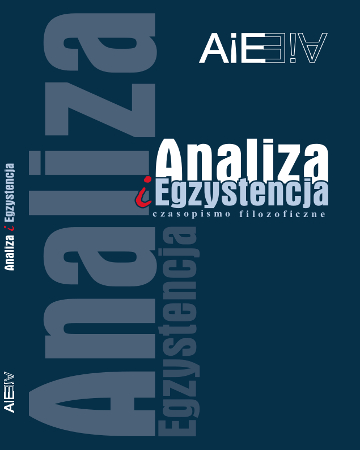
ISSN: 1734-9923
eISSN: 2300-7621
OAI
DOI: 10.18276/aie.2019.46-03





Issue archive /
46 (2019)
Znaczenie koncepcji tożsamości narracyjnej na tle Jürgena Habermasa tezy o kolonizacji świata życia przez system (Identity Problem and the Loss of the Communication Skills)
(The meaning of narrative identity concept in the light of Jurgen Habermas' thesis about the colonization of the world of life by the system)
| Authors: |
Wojciech
Torzewski

UKW w Bydgoszczy |
| Keywords: | identity problem loss of the communication skills narrative identity Habermas colonization of the world of life |
| Data publikacji całości: | 2019 |
| Page range: | 15 (41-55) |
Abstract
The aim of the article is to show the meaning of the narrative identity concept that becames visible in the light Habermas’ social philosophy, and in particular of the thesis about the colonization of the world of life by the system. In this perspective, pluralism itself, the multiplication of discourses in the modern and post-modern world does not pose a threat to identity. Destructive for the constitution of personal identity is rather a special kind of unification of the sphere of communication, and thus weakening the narrative skills necessary for the formation of the subject.
Download file
Article file
Bibliography
| 1. | Arendt, H. (2000). Kondycja ludzka. Tłum. A. Łagodzka. Warszawa: Fundacja Aletheia. |
| 2. | Bauman, Z. (2000). Ponowoczesność jako źródło cierpień. Warszawa: Wydawnictwo Sic! |
| 3. | Cohen, J., Arato, A. (1992). Civil Society and Political Theory. Cambridge (MA): MIT Press. |
| 4. | Gallagher, S. (2015). Self and Narrative. W: J. Malpas, H.H. Gander (red.), The Routledge Companion to Hermeneutics (s. 403–414). London–New York: Routledge. |
| 5. | Fleming, T. (2009). Habermas o społeczeństwie obywatelskim, świecie życia i systemie: odkrywanie społecznego wymiaru teorii transformatywnej. Teraźniejszość – Człowiek – Edukacja, 1 (45), 29–46. |
| 6. | Habermas, J. (2002). Teoria działania komunikacyjnego. T. 2. Tłum. A.M. Kaniowski. Warszawa: Wydawnictwo Naukowe PWN. |
| 7. | Heidegger, M. (2009). Podstawowe problemy fenomenologii. Tłum. B. Baran. Warszawa: Fundacja Aletheia. |
| 8. | Hume, D. (2005). Traktat o naturze ludzkiej. Tłum. C. Znamierowski. Warszawa: Wydawnictwo Naukowe PWN. |
| 9. | Kant, I. (1984). Krytyka praktycznego rozumu. Tłum. J. Gałecki. Warszawa: PWN. |
| 10. | Kierkegaard, S. (1972). Bojaźń i drżenie. Tłum. J. Iwaszkiewicz. Warszawa: PWN. |
| 11. | Lyotard, J.-F. (1997). Kondycja ponowoczesna. Tłum. M. Kowalska, J. Migasiński. Warszawa: Fundacja Aletheia. |
| 12. | MacIntyre, A. (1996). Dziedzictwo cnoty. Tłum. A. Chmielewski. Warszawa: PWN. |
| 13. | Marquard, O. (1994). Rozstanie z filozofią pierwszych zasad. Tłum. K. Krzemieniowa. Warszawa: Oficyna Naukowa. |
| 14. | Mettrie, J.O. (1984). Człowiek-maszyna. Tłum. S. Rudniański. Warszawa: PWN. |
| 15. | Reut, M. (2010). Narracja i tożsamość. Wrocław: Wydawnictwo Dolnośląskiej Szkoły Wyższej Edukacji TWP. |
| 16. | Ricoeur, P. (2003). O sobie samym jako innym. Tłum. B. Chełstowski. Warszawa: Wydawnictwo Naukowe PWN. |
| 17. | Rorty, R. (1996). Przygodność, ironia, solidarność. Tłum. W.J. Popowski. Warszawa: Wydawnictwo Spacja. |
| 18. | Rosen, S. (1998). Hermeneutyka jako polityka. Tłum. P. Maciejko. Warszawa: Wydawnictwo Aletheia. |
| 19. | Rousseau, J.J. (2009). Umowa społeczna. Tłum. A. Peretiatkowicz. Kęty: Wydawnictwo Marek Derewecki. |
| 20. | Taylor, Ch. (2001). Źródła podmiotowości. Narodziny tożsamości nowoczesnej. Tłum. M. Gruszczyński, O. Latek, A. Lipszyc, A. Michalak, A. Rostkowska, M. Rychter, Ł. Sommer. Warszawa: Wydawnictwo Naukowe PWN. |
| 21. | Taylor, Ch. (1996). Etyka autentyczności. Tłum. A. Pawelec. Kraków: Znak. |